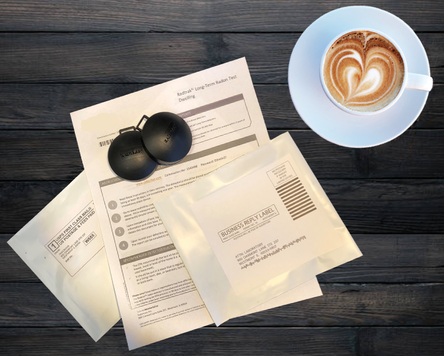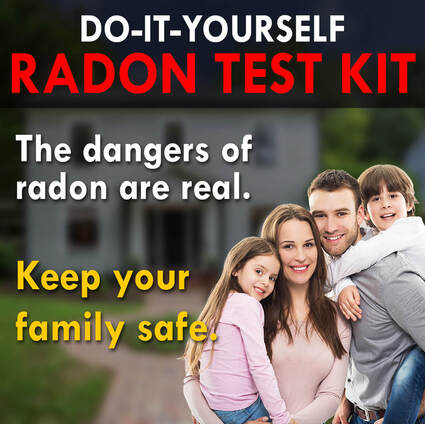|
Radon gas is a silent killer - one of those things that can be in your home or office, but you may not know about it until it does the damage. The affects can be very severe - according to various health authorities, radon is the biggest cause of lung cancer among non-smokers. If you have recently built or moved into any building, it's imperative to check for radon. To do that, you'll need a radon test kit. This article discusses what radon test kits are, when they are used and how to use them. IntroductionA radon test kit is a device used to measure the amount of radon gas in the indoor air. You set it up, allow it to detect radon gas for a predetermined amount of time, and then mail it to a certified lab capable of analyzing it. The lab will conduct a test and return the results to you via mail or email. If you do a short-term radon measurement and detect high levels, it's recommended you do a long-term measurement afterwards to confirm. If you get the same/similar results the second time, it's time to take action. Why Do You Need to Test for Radon?The World Health Organization identifies radon as a carcinogenic agent that can cause lung cancer. About 25,000 and 3,000 people die from radon annually in the United States and Canada respectively. While harmful, radon has no flavor, odor, or color; therefore, you'll need to do a special test to detect the presence of this gas. Now remember, radon has been found in every part of the world and can build up in any building, anywhere. So, radon testing is something you can't afford to miss, for your family's safety. Types of Radon Test KitThere are two types of radon testing kits. Let's explore them. Short-Term KitA short-term test will take anywhere between 2 and 90 days. The type of short-term radon test kit we provide takes at least 10 days. It's mostly used as a screening test to determine if a long-term measurement is required; however, sometimes people cannot wait 90 days to receive a final test result. For example, realtors have a timeline to follow and are often pressured to get a list of tasks done before the closing date. They absolutely cannot wait 90+ days to receive results, so they depend on the results that come from performing a short-term radon test. Long-Term Kit A long-term test kit measures the radon levels in an area for at least 90 days and up to a year. It is more accurate than a short-term test because it exposed to a greater sample size of radon gas; therefore, organizations like Health Canada, for example, only recognize the results derived from a test like this. On the other hand, the E.P.A. will recognize both short-term and long-term results. Which Kit Should I Use?Well, you should first conduct a short-term test to get a rough idea about the radon levels in your house. If the concentration is really high, then you should install a radon reduction system right away. If the short-term test results are just under or just above the guideline, then it would be a good idea to then perform a long-term radon measurement. You can also conduct a radon measurement - either short-term or long-term - after a radon mitigation system has been installed in your house so that you know it is working effectively. Can I Do My Radon Testing?Of course you can conduct a radon test on your own. You do not have to be licensed or certified to do so; however, since there are many steps and possibilities of committing an error, you may better be off calling a radon measurement professional if you want to make sure it's done right. Also, depending on where you live, you may need to hire a professional to do radon testing for real estate transactions. Be careful about this - look into this prior to the start of any test. How To Conduct a Radon TestThis depends on the type of kit you have bought. You'll need to look at the user's guide and follow the instructions accordingly. Most testing kits consist of a radon detector, a form, instructions, some literature on radon, and return mailing packaging to ship off the sample. You place the detector in the basement and leave it for a minimum of 48 hours or longer, depending on the type of test. Finally, you send the sample to the lab and get the results. You will receive the results by mail, email, or both. Where Can I Get a Radon Test Kit?Radon testing kits can be purchased from local hospitals and stores. If you live in the USA, you can buy them from your state's national radon program services website. Some tests require additional testing fees to be paid before the kits are mailed to the lab. In addition, you can buy discounted test kits from our website for more convenience. We deliver everywhere in the USA, Canada, and soon to be all over the world. Ways To Make A Radon Test More EffectiveHere are some steps you can follow to get a more accurate reading of your home's radon level, especially if you plan on doing a short-term radon test:
More FAQs Related to Radon Test KitsHere are some more frequently asked questions about radon test kits... Are Radon Test Kits and Monitors the Same?No, test kits are not the same as continuous radon monitors. Continuous monitoring devices are more expensive and are generally used by professionals (although consumers are free to use them as well) to test the average radon level in the house. While accurate, they may be a luxury you don't need. What Is a Passive Radon Detector?You may often hear the phrase 'passive radon detector' when looking for a test kit. Don't be confused. It's just another name given to a detector in a radon testing kit that doesn't use electricity. What to Do if I Find Radon Gas in My House?The Environmental Protection Agency and Health Canada recommend installing a radon reduction system if you discover a high concentration of radon in your home. A high concentration would be considered any concentration above the guideline you choose to follow.
1 Comment
7/25/2023 11:45:40 pm
It serves as a helpful guide for anyone concerned about radon exposure and wanting to take proactive measures to safeguard their health.
Reply
Leave a Reply. |
AuthorI am a professional radon technician who enjoys writing about radon to spread awareness of this harmful, radioactive gas. Archives
February 2023
Categories
All
|



 RSS Feed
RSS Feed
